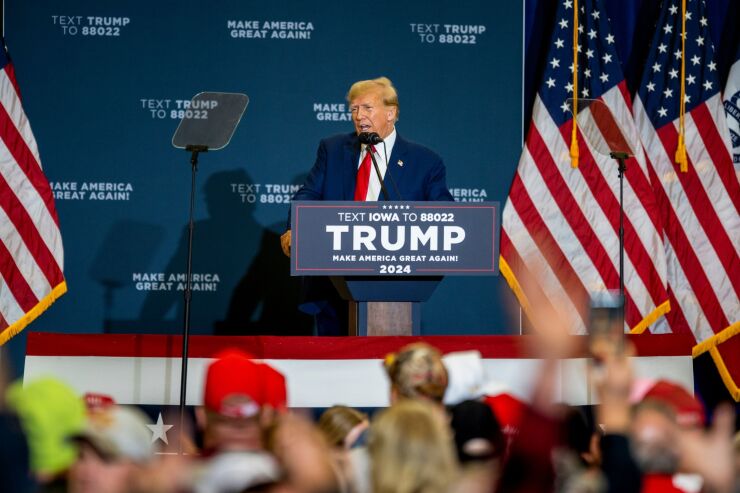Donald Trump plans to make permanent the 2017 individual tax cuts that he enacted as president while keeping corporate tax levels unchanged in an appeal to working and middle class voters should he retake the White House, according to people familiar with the matter.
Trump's preference to keep the 21% corporate rate marks a shift from his desire while president to lower the corporate rate to 15%, which generated opposition from both Republicans and Democrats.
While the 21% tax rate is permanent, his 2017 tax cuts for individuals are set to expire after 2025. Those cuts overwhelmingly benefit wealthy households, small business owners and those in the real estate industry.

The ex-president-turned-2024 candidate's planning also involves stronger tariffs and energy development with fewer regulations, the intended goal of which is to lower the cost-of-living for Americans, the people said.
Polls show Trump and President Joe Biden barreling toward a rematch of their hotly contested 2020 election. The economic plan dovetails with most surveys that show the economy as a vulnerability for Biden and reveal Americans trust Trump more on the issue. Still, Biden has made so-called kitchen table issues, from health care costs to junk fees, a centerpiece of his reelection effort.
The 2025 expiration of the Trump tax cuts also sets up a political dilemma for Biden should he win a second term. He would be forced to decide whether to extend a Republican tax cut that includes lower rates for individuals and a bigger child tax credit, or let his predecessor — and political rival's — signature legislation lapse, raising taxes on some households.
In 2017, Trump signed a law that cut the corporate tax rate from 35% to 21%. While Trump initially asked for the rate to drop to 15%, negotiations between his administration and Congress ultimately landed at 21%.
The Trump tax cuts were politically unpopular at the time they were passed because the benefits were skewed to corporations and wealthy individuals. The dislike for the Tax Cuts and Jobs Act, and reductions to some benefits like the state and local tax credit, helped Democrats win back the House in the 2018 midterms.
Though many benefits were directed toward business and high earners, the law also included some provisions, including a larger standard deduction and a more generous child tax credit, targeted at middle-income people.
The Trump campaign didn't immediately respond to a message left for comment.
Trump has previously vowed to tackle taxes.
"And with your vote in this election, we will cut your taxes even further," Trump said at a campaign rally in Durham, New Hampshire last month.
Trump's campaign speeches aim to stir nostalgia about the lower inflation and gasoline prices that he presided over, despite the economy falling into a recession during the COVID-19 pandemic that beset the globe during the 2020 presidential election year.
Trump is also interested in price transparency in the health care industry to ensure consumers know the cost of their medical care upfront, the people, who were granted anonymity to discuss internal deliberations, said.
Blue collar, working class voters largely form the bedrock of the support Trump's maintained within the Republican party since 2016.
"Frankly, there's no political reason to want to try to take care of the very wealthy," said Newt Gingrich, former House Speaker and Trump ally. "The Republican Party is going through a huge political revolution."
Ben Carson, Trump's former secretary of Housing and Urban Development, has been advising the ex-president on urban policies should he retake the White House. Some of those include deepening the opportunity zone program from his first term and also investing in community organizations, promoting housing development and using federal lands to shelter homeless people, Carson said.





